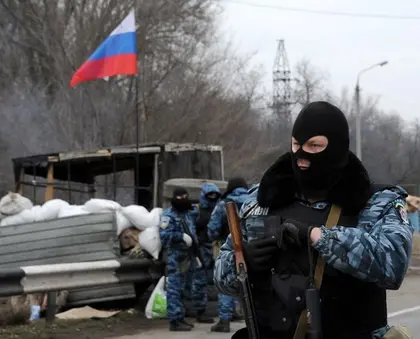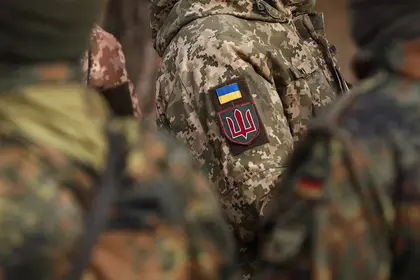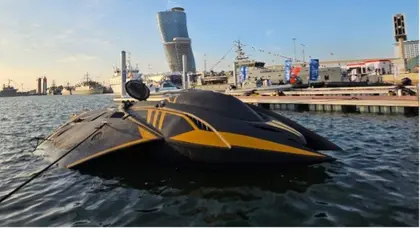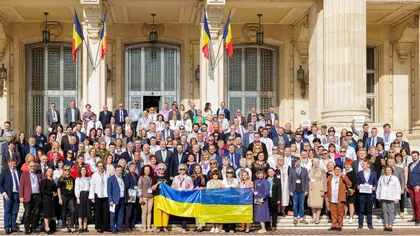The men wore an assortment of military uniforms, some had their faces covered with Balaklavas. Their only insignia were orange-and-black stripy St. George ribbons, a recognized military symbol in Russia that dates back to its empire days.
“Pull over and get out,” the men barked. There was no point in arguing with people so heavily armed.
On March 1, the Russian military had not yet cemented their control of Crimea. But by the morning of March 2, they had taken over, blocking access by air, road and train to everyone except those allowed inside or outside. And journalists were not on the list of people to be let through checkpoints.
After they were stopped on March 1, the journalists had their luggage inspected twice, and their bulletproof vests and helmets (brought for themselves and their colleagues) confiscated. Their pleas to return the company equipment went unanswered.
“I have been to many nasty checkpoints in the world, I covered drug trafficking wars in Columbia, but I have never had my bulletproof vest confiscated,” the journalist later said, requesting anonymity for security reasons.
The camouflaged men made it clear they did not like journalists.
“You’re provocateurs,” one of the men said. “Your helmet has a bullet hole in it, if it ends up in front of the camera, we will be accused of shooting.”
He then went on to threaten to use weapons against journalists if they continued to argue and disobey.
It turned out, this TV crew had a lucky escape.
A Mykholayiv correspondent for Ukraine’s Inter TV channel had most of his filming equipment confiscated, except a small camera.
The Inter journalist had been filming the same checkpoint the previous day secretly, and it seemed that one of the militants had seen his footage. Besides, a day later they were operating under a different set of instructions: no journalists were allowed in or out of Crimea, except Russians.
The instructions came from the Russian team on the ground who supervised Sergei Aksenev, Crimea’s new pro-Russian prime minister. The Kyiv Post learned this from a source in the intelligence community, who tried to help get permission from the new, self-proclaimed government to enter the peninsula.
“There is a full-scale military invasion being prepared,” the source said.
Aksionov’s spokeswoman confirmed that on that day he assumed emergency powers, but said there was no system in place to issue permits for journalists.
But for the militants at Armyansk checkpoint, it wasn’t just instructions, it was personal. Grabbing his gun tight, one of the men, who said he was a member of Berkut riot police, fumed that journalists portrayed Berkut as gays who killed children. He said the media have been bisased during the revolution, siding with EuroMaidan protesters.
“Did you report when our guys had their hands blown up?” he was shouting. They particularly disliked the European media and the European Union in general, saying that it was on the verge of collapse, rigged with high unemployment among the youth and other economic problems.
They said journalists did not need to see what’s going on and “broadcast their lies” to the rest of the world. By the end of the day, no journalists were allowed in or out of Crimea by car, and trains were also disrupted as the Russian Duma voted to allow Russian President Vladimir Putin to send his troops to Ukraine. By that time, the Crimean peninsula was already firmly in control of the Russian-backed militants.
At the Armyansk checkpoint, there were three different kinds of militants.
One of the groups were Kuban Cossacks, whose uniforms included fur hats. They were the only group who did not hide their faces.
The second group wore good quality camouflage uniforms with no military insignia, but were assumed to be Russian soldiers. Akim Vishnevskiy, a journalist of Hromadske TV, who also tried to enter Crimea through the same checkpoint, said that they are equipped very differently than the Ukrainian special services.
“They’re special military units, with water storage on their back,” he says.
The other group was seemingly composed of representatives of Berkut riot police, which had been dismissed by the Ukrainian government for excessive violence and crimes during the protests, but then formed anew by the Crimean authorities under Russian patronage. Russian consulate in Simferopol also said it was ready to issue passports to Berkut troopers, in violation of Ukrainian law.
But a journalist from Hromadske TV, who also tried to enter Crimea by road on March 1, said the militants seemed to no longer recognize Ukrainian law.
“We told them they were on the territory of Ukraine, but they said they don’t think so. They think they’re now on Russian territory,” the Hromadske TV journalist said.
Journalists at the checkpoint observed that most of the militants at the checkpoint were not professional because. They failed to check documents and swung their Kalashnikovs around dangerously.
The Inter TV journalist said that, after watching the militants at the checkpoint for two days, he also realized that they were not up to the job.
“They’re inadequate. One of them burst into tears as he was telling me yesterday how their colleagues were chopped to bits in Kyiv. And this guy is armed up to his teeth,” the journalist said.
Kyiv Post deputy chief editor Katya Gorchinskaya can be reached at [email protected]
Editor’s Note: This article has been produced with support from the project www.mymedia.org.ua, financially supported by the Ministry of Foreign Affairs of Denmark, and implemented by a joint venture between NIRAS and BBC Media Action.The content in this article may not necessarily reflect the views of the Danish government, NIRAS and BBC Action Media.
You can also highlight the text and press Ctrl + Enter







Comments (0)